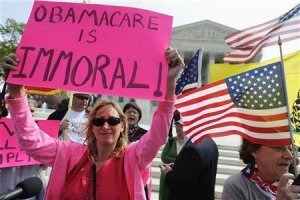|
The powers of Congress are enumerated in several places in the Constitution. The most important listing of congressional powers appears in Article I, Section 8 (see left) which identifies in seventeen paragraphs many important powers of Congress. In this section, we consider how the federal government's power to spend tax dollars has been interpreted by the Supreme Court.. SPENDING POWER
 Opponents of the Affordable Care Act ("Obamacare") won a small victory when the Court held that states which refuse to expand Medicaid coverage cannot be denied federal funds for their more limited, existing, programs. In 2012, the Court considered whether provisions of the Affordable Care Act, which withheld federal funds from states that failed to expand Medicaid coverage in specified ways, was within the power of Congress under the Spending Clause. In National Federation of Independent Business v Sebelius, the Court held that it was unconstitutional to threaten states with the withholding of all federal Medicaid funding, including their existing funding, for failing to expand coverage in the ways Congress sought to encourage. Chief Justice Roberts, in a part of his opinion joined by Justices Breyer and Kagan, concluded that federal funds withheld, representing perhaps 10% of a state's entire budget, was so substantial that states would have no real choice but to give into Congress's demands. As a result, seven justices agreed that the Affordable Care Act's Medicaid expansion provisions violated the principle that the spending power can not be used to coerce states into enacting legislation or participating in a federal program. The Court distinguished South Dakota v Dole, noting that the funds potentially lost by South Dakota in that case representing only one-half a percent of the state's budget. |
SPENDING POWER-- QUESTIONS 2. Could Congress condition the receiving of federal dollars to fight crime on a state's having enacted the death penalty? How--if at all--would such a condition differ from the condition upheld in South Dakota vs Dole? 3. What result in South Dakota vs Dole if South Dakota stood to lose all federal highway money if it didn't raise its drinking age? What if it stood to lose 30%? 4. Does the Court's ruling in the Affordable Care Act case suggest the Court will be closely scrutinizing large federal grant programs in the future? Note that SEVEN justices agreed that withholding federal funds from states that failed to expand their Medicaid coverage was outside of Congress's Spending Clause power. |
